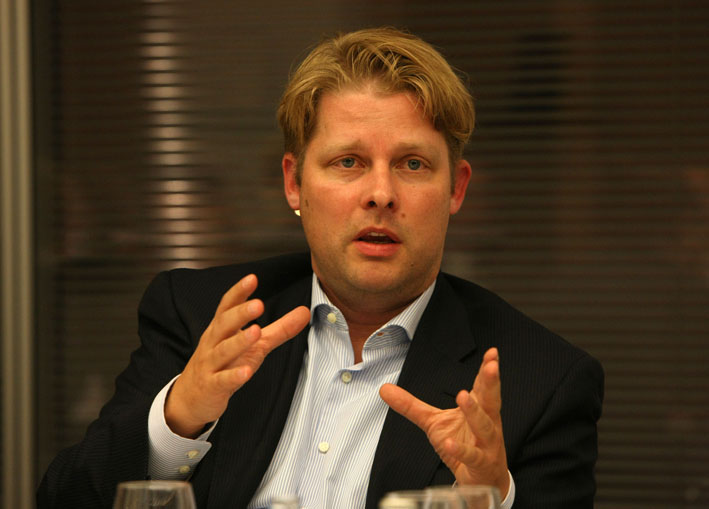Tomorrow, the funeral of the Russian Ambassador Andrei Karlov, who was shot in Ankara, will be held. The funeral and commemoration events will be addressed by President Putin, who for this purpose moved his "big press conference" to Friday.
The well-known German expert on Islam and terrorism, Guido Steinberg, from the center of the political analysis 'Stiftung für Wissenschaft und Politik' (SWP), advising the German government, speaking to DLF, commented on the terrorist attack, as a result of which the Russian Ambassador Andrey Karlov was killed in Ankara. According to the expert, it is a a mystery for him, why the Russian ambassador to Turkey - a country with such problematic relations with the Russian Federation - was not protected in the best way. "I'm not sure of the Russian thesis that the Turks poorly guarded the event. Things like this can always happen in present Turkey. But, after all, the security of the Russian ambassador in a country is a task for the Russian side as well. And I cannot understand why Russian guards did not stand next to ambassador - in this case, even if they did not prevent the first shot, they would be able to prevent a second," Steinberg said.
The expert noted that the radical "scene" in Turkey is one of the largest in the West, and there is a constant interaction between the various factions. "There almost no such nationalistic Islamists in the world, as in Turkey, and therefore, the fact should be taken into account that a very broad range of forces in the country perceive the events in Syria as a provocation and want to show Russia their reaction, as well as cause damage to the relations between Turkey and Russia, which have been improved significantly over recent months," the expert believes.

Guido Steinberg
According to Steinberg, the attack shows how vulnerable is present Turkey. "I got the impression that, due to the weakening of the security forces after the mass cleansing carried out in their ranks, the Turkish state is no longer able to face numerous terrorist groups, which can be seen through intensified violence in the Kurdish-populated regions of the country and the increasing number of PKK terrorist attacks. And now, we can add here the Islamist terrorist attack, which was probably carried out by ISIS".
"If the terrorist, which killed the Russian ambassador, was not a loner willing to "take revenge", but acted on the instructions of any organization, the purpose of the terrorist attack was to damage the Russian-Turkish relations," the SWP expert is confident. "At the moment, there is no indication that it this purpose been achieved. Both countries know that they are very important to each other. For Turkey, the fight against YPG - the PKK branch in Syria - is important, and for Russia - the role of Turks in support of militants in Syria, Russia and Turkey have converged on the Syrian issue over the past months, and it looks like they do not want to put this rapprochement at risk," Guido Steinberg believes. "It may change, if it appears that leads on a terrorist attack go not to somewhere in Raqqa, but to the Turkish state itself. If it turns out that there are people in Turkey, the Islamist motivation of which is so strong, that they may want to prevent any kind of cooperation between Ankara and Moscow, I think that the Russian position will also change," the analyst warns.

The head of Istanbul Office of the Heinrich Böll Foundation and an expert of the German Council on Foreign Relations (DGAP), Kristian Brakel, commented on the situation in Turkey after the murder of the Russian Ambassador Andrei Karlov, speaking to the Swiss edition of «20min». According to the analyst, the version that the murder was linked to FETO raises some questions. If we assume that the terrorist was a follower of Fethullah Gulen, the question arises, what has been achieved by the Turkish authorities through mass layoffs in the security services, if their aim was to prevent exactly such situations? Kristian Brakel essentially admits that the terrorist attack could be directed against the Turkish-Russian relations.
Commenting on the Syrian policy of Erdogan's government, the expert noted: "There is the Turkish government's rhetoric for Turkish voters, as well as the rhetoric for foreign countries. And its policy towards Russia is not important here. Domestically, Erdogan and his government have positioned themselves as the defenders of the Syrian opposition, but in its relations with Russia Ankara has little room for maneuver in the Syrian issue. Turkey is not able to take in Syria anything without getting the "green light" from Russia. Many government supporters do not see this contradiction, and pay attention only to the vigorous rhetoric," Brakel stressed. The DGAP expert does not expect achieving of any basic agreements on the Syrian issue at the meeting of the foreign ministers of Russia, Turkey and Iran in Moscow. However, some red lines will be agreed there - especially with regard to the fight against the PKK, Brakel believes.






